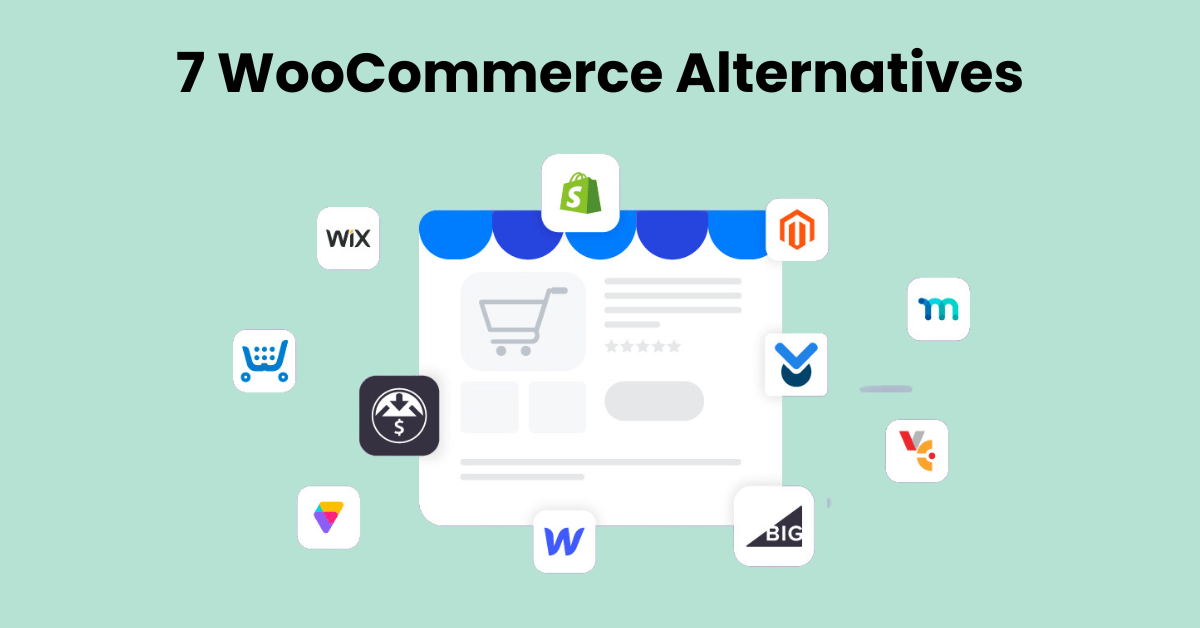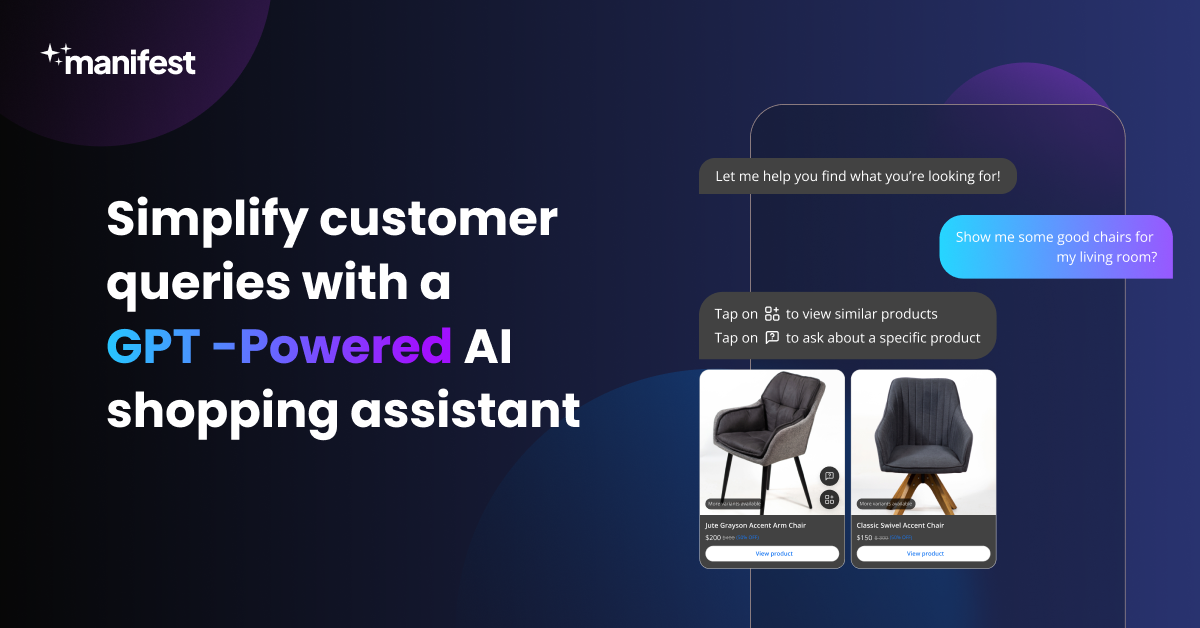7 WooCommerce Alternatives: Choosing the Best Ecommerce Solution

Choosing the right ecommerce platform is crucial for the success of your online store. While WooCommerce is a popular choice for many, it's not the only option available. Depending on your business needs, budget, and technical expertise, there may be other solutions that better align with your goals. This blog explores seven alternatives to WooCommerce, each offering unique features and benefits. From user-friendly interfaces to scalable infrastructure, we'll dive into what makes each platform stand out. Whether you're starting a new online business or considering a switch from WooCommerce, understanding your options is the first step towards finding the best ecommerce solution for your venture.
7 Best WooCommerce Alternatives
Here is the list of 7 best WooCommerce alternatives:
Shopify

Shopify is one of the most popular woocommerce alternatives that allows individuals and businesses to create their online stores. It provides a range of customizable templates to design your storefront, manage products, process payments, and handle shipping.
Pros:
- User-friendly: Its intuitive interface makes it easy for non-technical users to set up and manage their stores.
- Comprehensive features: Offers a wide array of built-in tools for marketing, SEO, and analytics.
- Reliable hosting: Ensures fast loading times and security for your online store.
Cons:
- Monthly fees: Users pay a monthly subscription, which can add up, especially with additional app subscriptions.
- Less customization: While user-friendly, it offers less flexibility for deep customization without coding knowledge.
Why Better than WooCommerce:
Shopify provides a more turnkey solution, handling hosting and security, making it an appealing choice for those who prefer a hassle-free setup. It's particularly suitable for beginners or businesses looking to quickly start and scale their online presence without worrying about technical details.
Ratings:
Shopify consistently receives high ratings for its ease of use, customer support, and robust infrastructure, often scoring above 4 out of 5 stars on major review platforms.
BigCommerce

BigCommerce is one of the best woocommerce alternatives that allows businesses to create an online store, manage sales, and handle operations. It provides a range of customizable templates, tools for SEO, marketing, and analytics, as well as various integration options with third-party apps.
Pros:
- Offers a variety of built-in features and tools for sales, marketing, and SEO.
- Scalable for businesses of all sizes, supporting growth without requiring platform changes.
- User-friendly interface with 24/7 customer support.
Cons:
- Can be more expensive than other options, especially for small businesses, due to its tiered pricing structure.
- Some customizations require knowledge of HTML and CSS.
Why Better Than WooCommerce:
BigCommerce is one of the popular woocommerce competitors often seen as more scalable and less reliant on plugins than WooCommerce. It's a fully hosted solution, which means businesses don't need to manage web hosting, security, or updates themselves. This can be a significant advantage for businesses looking for an all-in-one solution without the complexity of managing technical aspects.
Ratings:
BigCommerce consistently receives high ratings for its comprehensive features, customer support, and ease of use, with many users appreciating its out-of-the-box capabilities for growing businesses. It often scores above 4 out of 5 stars on major review platforms.
Magento (Adobe Commerce)

Magento (Adobe Commerce) is one of the famous woocommerce alternatives designed for businesses looking to build and scale their online stores. It offers a wide range of features and customization options, making it suitable for both small businesses and large enterprises.
Pros:
- Highly customizable, allowing for unique store designs.
- Robust functionality supports a wide range of ecommerce needs.
- Strong community and extensive marketplace for plugins and themes.
Cons:
- Requires a higher level of technical skill to set up and manage.
- Can be resource-intensive, leading to higher hosting costs.
Why Better Than WooCommerce:
Magento offers more advanced features and scalability out of the box compared to WooCommerce. It's particularly well-suited for businesses planning to expand significantly or those requiring complex customizations. While WooCommerce is user-friendly and integrates easily with WordPress, Magento provides a more robust solution for stores with extensive product inventories and global sales ambitions.
Ratings:
Magento consistently receives high ratings for its flexibility and scalability, often scoring above 4 out of 5 stars on various review platforms. However, it's important to consider the technical skill required to manage a Magento site effectively.
Squarespace Commerce

Squarespace Commerce is an integrated feature of the Squarespace website building platform, designed to help users create and manage online stores. It provides tools for product listing, order processing, and customer management directly within the Squarespace interface.
Pros:
- User-friendly design tools make it easy to create visually appealing online stores.
- All-in-one platform includes hosting, templates, and commerce features.
- Strong focus on aesthetics with high-quality, customizable design templates.
Cons:
- Less flexibility for customization compared to platforms dedicated solely to ecommerce.
- Limited third-party app integration, which might restrict some functionality.
Why Better than WooCommerce:
For users prioritizing design and simplicity, Squarespace Commerce offers a more streamlined approach to setting up an online store without the need for additional plugins or themes. It's particularly appealing for those with minimal technical experience or those who prefer to manage their website and store through a single interface.
Ratings:
Squarespace Commerce generally receives high ratings for design quality and ease of use but may be rated lower for customization options and advanced ecommerce features compared to more specialized platforms like WooCommerce.
Wix eCommerce

Wix eCommerce is a famous woocommerce alternative that allows individuals and businesses to create, manage, and grow their online stores. It's part of the broader Wix website-building ecosystem, known for its user-friendly drag-and-drop interface.
Pros:
- Ease of Use: Its intuitive design tools make setting up and customizing an online store straightforward, even for beginners.
- All-in-One Solution: Wix eCommerce provides hosting, templates, and built-in features like SEO tools and payment gateways without the need for additional plugins.
- Design Flexibility: Offers a wide range of customizable templates tailored to various industries.
Cons:
- Scalability: While suitable for small to medium-sized businesses, it may not handle the demands of very large stores as efficiently.
- Customization Limits: Advanced users may find the customization options somewhat restrictive compared to open-source platforms.
Why Better Than WooCommerce:
Wix eCommerce stands out for those seeking simplicity and an all-in-one package, eliminating the need for separate hosting and extensive setup that WooCommerce requires.
Ratings:
Wix eCommerce generally receives favorable reviews, with users rating it highly for ease of use and design. However, ratings may vary, especially when considering scalability and advanced customization needs.
PrestaShop

PrestaShop is a free, open-source ecommerce platform that allows users to create and manage their online stores with customization and flexibility. It offers a range of features and tools designed to facilitate online selling, including product management, payment gateway integration, and analytics.
Pros:
- Customization: Offers extensive options for customization to meet specific business needs.
- Community Support: Has a large community of developers and users, providing a wealth of resources and support.
- Multilingual and Multi-currency Support: Makes it easy to cater to a global audience.
Cons:
- Technical Knowledge Required: Setting up and customizing the store may require some technical understanding or developer assistance.
- Performance: Large stores with many products may experience slower performance without proper optimization.
Why Better Than WooCommerce:
PrestaShop stands out for its degree of customization and flexibility, especially for users looking for an open-source solution without being tied to a specific hosting platform like WooCommerce, which is designed primarily for WordPress.
Ratings:
PrestaShop often receives high marks for its scalability and customization options, with average user ratings around 4 out of 5 stars across various review platforms. Users praise its comprehensive feature set, though they note a steeper learning curve compared to some alternatives.
OpenCart

OpenCart is most preferred woocommerce alternative that allows business owners to create their online store. It offers a range of customizable templates and modules, along with the flexibility to add functionalities through extensions.
Pros:
- Customization: With access to the source code, OpenCart offers extensive customization options to tailor your store as per your business requirements.
- Cost-Effective: Being open-source, it's free to use, with costs mainly associated with hosting, themes, and extensions.
- User-Friendly: Its admin dashboard is straightforward, making store management accessible for non-technical users.
Cons:
- Support: While there is a community for support, dedicated help can be limited compared to paid solutions.
- Performance: For large-scale operations, additional plugins and customizations might impact site speed.
Why Better than WooCommerce:
OpenCart provides an alternative for users looking for a solution that's easy to set up and manage without being tied to WordPress. It's particularly appealing for those seeking more customization freedom and a straightforward user interface without the need for deep technical knowledge.
Ratings:
OpenCart generally receives positive ratings for its flexibility and user interface, often ranging around 4 out of 5 stars across various review platforms.
AI advantage of using Shopify over WoCommerce

Integrating AI into Shopify stores, particularly through platforms like Manifest AI, brings a host of benefits that can significantly enhance ecommerce operations. Manifest AI, with its advanced use of AI technology, particularly GPT (Generative Pre-trained Transformer) models, is designed to seamlessly integrate with Shopify, offering features that automate and personalize customer interactions, streamline operations, and provide insightful analytics.
Benefits of Using Manifest AI with Shopify:
- Automated Customer Service: Manifest AI's chatbot capabilities allow for automated, intelligent responses to customer inquiries, reducing response times and increasing customer satisfaction.
- Personalized Experiences: By analyzing customer data, Manifest AI can offer personalized product recommendations and content, making each customer's shopping experience unique and tailored to their preferences.
- Data-Driven Insights: The platform provides valuable analytics on customer behavior, preferences, and store performance, enabling store owners to make informed decisions to optimize their strategies and operations.
- Increased Efficiency: By automating routine tasks, Manifest AI frees up time for store owners to focus on strategic growth initiatives, making the management of an online store more efficient and less time-consuming.
Conclusion
While WooCommerce is a popular choice for many online businesses, there are several compelling alternatives that cater to a wide range of ecommerce needs. Each platform, from Shopify to OpenCart, brings its unique set of features, ease of use, and customization options, making it vital for store owners to consider their specific requirements when choosing an ecommerce solution. Exploring these alternatives provides the opportunity to find a platform that not only matches your business model but also supports its growth and evolution. As the ecommerce landscape continues to expand, selecting the right platform is crucial for establishing a successful online store.

.png)
